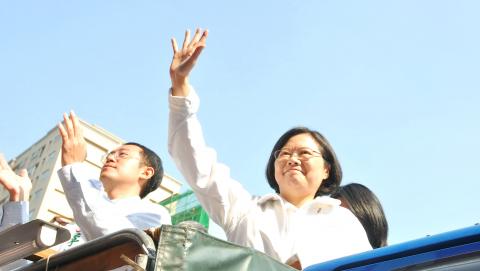|
Tensions in DPP heighten after defeats
MOVING ON?Some in the party’s elders faction are
pressuring Chairperson Tsai Ing-wen to step down, saying that others have done
so after similar defeats
By Vincent Y. Chao and Flora Wang / Staff
Reporters

Democratic Progressive Party Chairperson Tsai
Ing-wen, right, waves to residents yesterday as she tours Sanchong, Lujhou and
Sinjhuang cities to thank those who voted for her in Saturday’s Sinbei City
mayoral election, which she lost to her Chinese Nationalist Party (KMT) opponent
Eric Chu.
PHOTO: KUO YEN-HUI, TAIPEI TIMES
Tensions within the Democratic Progressive Party (DPP)
appeared to be rising in the wake of Saturday’s disappointing showings in the
special municipality elections, with some calling for DPP Chairperson Tsai
Ing-wen (蔡英文) to either resign or abandon a possible presidential bid.
Several DPP heavyweights, who had ostensibly given Tsai their support after
three prior by-election successes earlier this year, have publicly spoken out
over the past two days saying she should take responsibility for Saturday’s
less-than-stellar results.
Former vice president Annette Lu (呂秀蓮), who serves on the party’s Central
Executive Committee, launched a stinging attack on Sunday, asking why the DPP
was unable to find any better candidates.
MOVING ON
“She has already lost one [municipal] election, how come the media continues to
portray her as an aspirant for election to an even higher post?” Lu said in an
interview on SET TV. “Doesn’t the DPP have other talent?”
Other politicians in the party’s kung-ma (or “elders”) faction took the rhetoric
to an even higher level, using TV appearances yesterday to directly call on Tsai
to resign.
Past DPP leaders, they said, have all stepped down following electoral defeats.
“At the very least we had expected three seats or even four seats, but we only
ended up with two. Of course she should step down as [party leader],” Huang -Ching-lin
(黃慶林), the former head of the DPP’s Taipei City chapter, told FTV News.
Similar sentiments were also made by You Ching (尤清), a former Taipei County
commissioner who lost to Tsai during the party’s leadership elections in May.
The remarks were believed to reflect fears that Tsai would follow in the
footsteps of former premier Frank Hsieh (謝長廷), who battled President Ma Ying-jeou
(馬英九) in the 2008 presidential election despite losing a campaign for Taipei
City mayor two years earlier. Hsieh lost to Ma by 17 percent.
Tsai and former premier Su Tseng-chang (蘇貞昌) in particular were expected to take
at least one seat in northern Taiwan on Saturday. Tsai, however, lost by a
margin of 5 percentage points and Su by 12 percentage points, leading DPP
officials to officially label the elections a defeat.
SUPPORT
Despite the setbacks, most DPP lawmakers said they would continue to support
Tsai, pointing to fairly substantial gains in the popular vote nationwide. The
DPP caucus officially said it would speak against any proposals to remove Tsai
from power.
“I don’t see the reason why Tsai should have to resign. There’s no reason at all
and we all oppose it,” DPP Legislator Pan Men-an (潘孟安) said. “If she were to
resign, it would probably make President Ma very happy.”
Deputy caucus whip Kuan Bi-ling (管碧玲) said that if any member of the Central
Standing Committee were to raise a proposal calling on Tsai to step down, the
entire caucus would unanimously oppose the motion.
Only one legislator, Chai Trong-rong (蔡同榮), also a prominent figure in the
kung-ma faction, saw things differently, saying Tsai should either step down or
forgo a future possible presidential bid, adding that she should focus on one
role at a time.
PLANS UNCLEAR
Tsai, in her first public appearance since the elections, said the party had yet
to officially sit down and discuss how it would tackle its nominations for 2012.
“I have [already] made myself very clear and it will not be an issue,” she said.
Kaohsiung Mayor Chen Chu (陳菊), who was re-elected by a landslide in Kaohsiung,
said she continued to support Tsai as chairperson, emphasizing that the party
had done rather well in the popular vote.
DPP party headquarters made substantial efforts during the election campaign,
Chen said, adding that the party did not fail to meet its goals in the
elections.
Asked if she had any aspirations for a presidential bid in 2012, Chen declined
to comment.
“It is not an issue,” Chen said on her way to thank voters.
In related developments, Kaohsiung County Commissioner Yang Chiu-hsing (楊秋興),
who lost his mayoral bid to Chen, said he would not rule out the possibility of
cooperating with the KMT.
“Cooperation with anyone or any political party is possible as long as it
benefits Taiwan, Taiwanese and Kaohsiung,” Yang said.
Yang, a former DPP member, also urged the party to revise its China policy and
pursue a “pragmatic” direction.
|
![]()
![]()
![]()